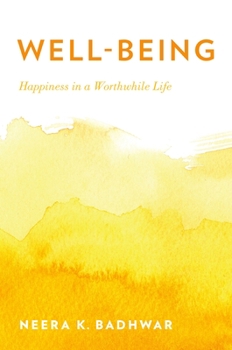Well-Being: Happiness in a Worthwhile Life
Select Format
Select Condition 
Book Overview
This book offers a new argument for the ancient claim that well-being as the highest prudential good -- eudaimonia --consists of happiness in a virtuous life. The argument takes into account recent work on happiness, well-being, and virtue, and defends a neo-Aristotelian conception of virtue as an integrated intellectual-emotional disposition that is limited in both scope and stability. This conception of virtue is argued to be widely held and compatible...
Format:Paperback
Language:English
ISBN:0190682078
ISBN13:9780190682071
Release Date:April 2017
Publisher:Oxford University Press
Length:260 Pages
Weight:0.85 lbs.
Dimensions:0.7" x 6.1" x 9.1"
Related Subjects
PhilosophyCustomer Reviews
0 rating





